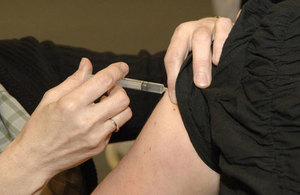Public can expect 'gold standard' protection against flu next year
The NHS is asking GPs and pharmacists to ensure their influenza vaccine orders for the 2018 to 2019 season use the most effective vaccines for the population.

The new guidance is based on recently published expert advice and will ensure the most vulnerable people get the best available protection next season.
From the clinical evidence available to GP practices and community pharmacists from the Joint Committee on Vaccination and Immunisation (JCVI) and the Green book since October it is clear that people aged 18 to 64 and at risk should get the quadrivalent vaccine which provides protection against 2 strains of influenza A and 2 strains of influenza B for the 2018 to 2019 winter season.
This will mean that pregnant women and other people in risk groups such as those with asthma and chronic obstructive pulmonary disease (COPD) will receive the quadrivalent vaccine protecting them against four strains of flu. Children, who are considered ‘super-spreaders’ and are generally more susceptible to flu B, will continue to receive the nasal spray quadrivalent vaccine.
Meanwhile, people aged 65 and over will be offered the newly-licensed adjuvanted trivalent vaccine, an enhanced form of the vaccine given to this age group in 2017 to 2018, which is designed to boost an immune response improving the effectiveness of the vaccine in this older age group. This was not available for the 2017 to 2018 season.
Given the evidence, use of these more effective vaccines in the 2018 to 2019 season is clearly in the best interests of patients, particularly given the association of flu with increased mortality.
The letter sent from NHS England and Public Health England (PHE) advises GPs and community pharmacy contractors to review all orders for the 2018 to 2019 season and ensure these are in line with suppliers who have extended the deadline for orders until the end of March.
It is estimated that flu causes around 8,000 deaths people each year. For the week ending 14 January 2018, there were a 289 reported intensive care admissions due to flu thought to be the peak of this year’s season. However, figures show over one and a half million more people got their free vaccination this year compared to last.
Dr Arvind Madan, GP and NHS England Director of Primary Care, said:
Flu can have serious health implications, particularly for the most vulnerable people, as well as having a significant impact on NHS services.
The evidence is clear so the NHS is going further to advise gold standard protection is provided. Importantly, the public ineligible groups can also play their part by getting their free vaccination again next year.
Professor Paul Cosford, PHE Medical Director said:
Vaccination is one of the best public health interventions we have available to us, saving thousands of lives every year. We already have one of the best flu vaccination programmes in the world and making these vaccines available next season should offer greater protection than ever before. We urge everyone eligible to take up the offer of flu vaccination.
Suppliers have also confirmed that there will be enough adjuvanted trivalent vaccine and quadrivalent influenza vaccine to meet demand. If GP practices and pharmacists encounter difficulties in placing or amending orders they have been advised to contact their local NHS England team.
Background
For further information please contact the NHS England media team on nhsengland.media@nhs.net or 01138 250958 / 01138 250959.
- The adjuvanted trivalent vaccine (aTIV) for all 65s and over. Given aTIV was only licensed for use in the UK in August 2017, long after orders were placed, this was not an option for the 2017 to 2018 season. However, the JCVI has now provided its advice given the receipt of its UK license
- The quadrivalent vaccine (QIV) for 18 years to under 65s at risk. In light of an independent cost-effectiveness study into QIV undertaken by PHE and considered by JCVI, the Green Book was updated in October 2017 to provide the advice that QIV is the best option for 18 to 65 at-risk groups in 2018 to 2019
About NHS England
NHS England leads the National Health Service in England - setting the priorities and direction, encouraging and informing the national debate to improve health and care.
The NHS in England deals with over 1 million patients every 36 hours and employs more than 1.5 million people, putting it in the top 5 of the world’s largest workforces. NHS England shares out more than £100 billion in funds and holds organisations to account for spending this money effectively for patients and efficiently for the taxpayer. It strongly believes in health and high quality care for all, now and for future generations.